Kenmure Street: 'No one is illegal. We all belong' - Dani Garavelli
The retired nurse, who moved to the Glasgow suburb from London eight years ago, had been there since the morning. She had watched the numbers swell from a handful of locals to a large, but peaceable crowd. She had joined in the chants: “These are our neighbours, let them go.”
“What impressed me was it was largely made up of people with prams and people walking their dogs,” she says now. “There was a real sense of unity. Then - at last - we saw the men being released. It was so exciting to feel we had achieved our goal.”
Advertisement
Hide AdAdvertisement
Hide AdTabassum Niamat, who has lived in East Pollokshields all her life, was also there. “There were a lot of people of all demographics,“ she says. “It was magical. I use that word because nothing was really said; it was spontaneous and organic and we had become one.”
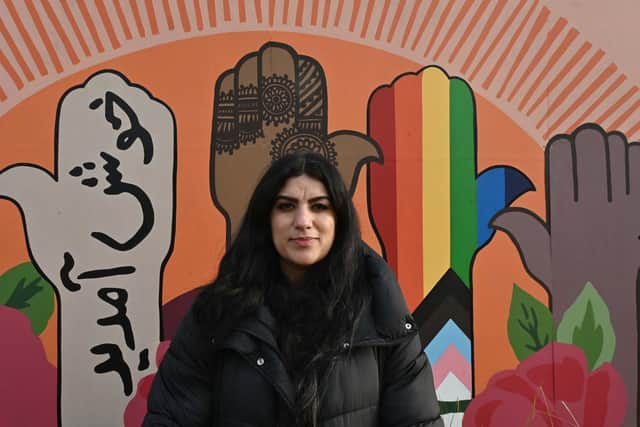

The Kenmure Street protest, which followed a dawn raid on the Muslim festival of Eid, made the national news.
The activist who lay under the vehicle for eight hours - preventing it from being driven away - was immortalised in song. Photographs of the two men, Lakhvir Singh and Sumit Sehdev, walking either side of human rights lawyer Aamer Anwar, fired the public imagination.
The fightback was voted one of the Top 10 “demonstrations that made a difference” in 2021.
McFarlane is a veteran of protests. She was at the anti-Iraq War demonstration in London in 2003 and the Make Poverty History march in Edinburgh during the G8 two years later.
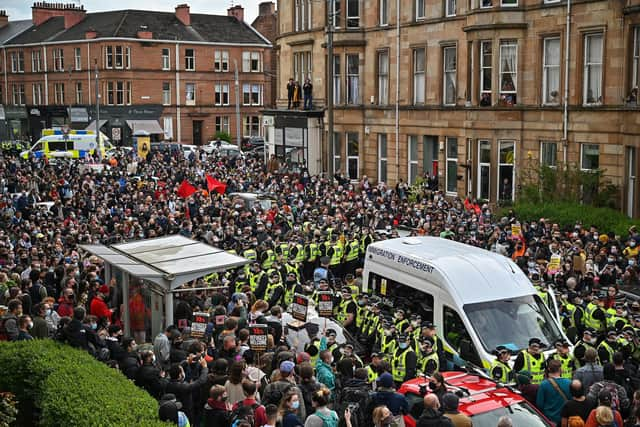

“I got a bigger sense of empowerment from the Kenmure Street protest than from walking alongside thousands of others against the Iraq War, because, frankly, in 2003 we might as well not have
bothered," she says.
“I felt this was a community that was prepared to stick together and to nail its colours to the mast. It left me with a sense that ordinary grassroots people can change things.”
While the protest prevented the detention of the two men, who had lived in Scotland for 10 years - it did not prevent other detentions and deportations. And the Home Office’s stance has
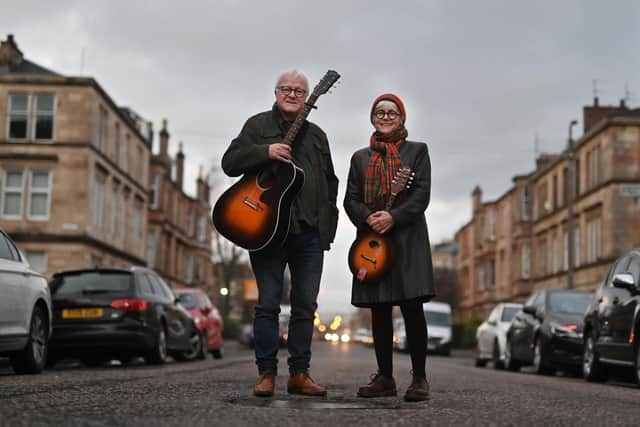

only hardened since.
Advertisement
Hide AdAdvertisement
Hide AdSeven months later, McFarlane was watching Home Secretary Priti Patel’s attacks on migrants with growing consternation. She was outraged when she realised the Nationality and Borders
Bill would criminalise the rescue of asylum seekers by the RNLI and others if they were deemed to be “facilitating” their arrival in the UK (the government later backed down on this
under the weight of the backlash). And she was distressed by the news of the mass drowning of migrants in the Channel.
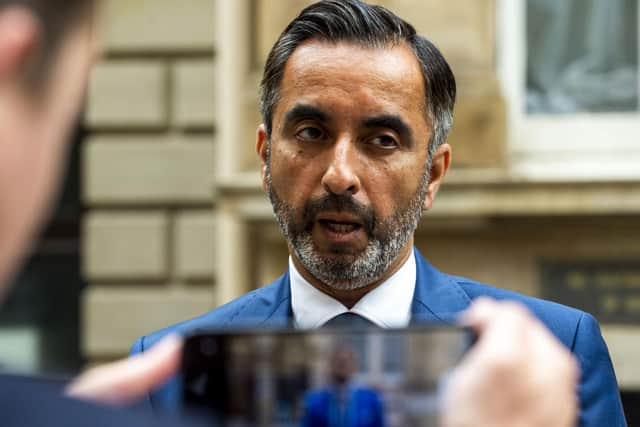

At the same time she became aware that - if passed - the Bill would allow the government to revoke the British citizenship of those deemed to have dual heritage without notice. She understood the impact this would have on the many people of south Asian and other ethnic minority backgrounds who live in East Pollokshields.
“I was cursing and swearing at the TV and thinking how the great Glasgow protesters - the Mary Barbours, the Helen Crawfurds, the John Macleans, the Jimmy Maxtons - must be spinning in
their graves that we are letting this creeping fascism happen," she says. “And then I thought: ‘Beverly McFarlane - put your money where your mouth is’.”
Spurred on by the success of the Kenmure Street protest, she posted her thoughts on a community Facebook page and others, including Niamat, quickly became involved. In the week before Christmas, 15 people met around a bonfire. They planned an awareness-raising gathering in Pollokshields and pledged to join a Refugees for Justice event in George Square next Saturday [29 January 29] where a bench will be dedicated to those asylum seekers who have died whilst awaiting a decision on settled status.
When I visited Pollokshields last week, posters for the local event were everywhere: in windows and shopfronts; on parked vehicles; on the bright green doors of the Zia-ul-Quran mosque. “No-
one is illegal . We all belong,” they read.
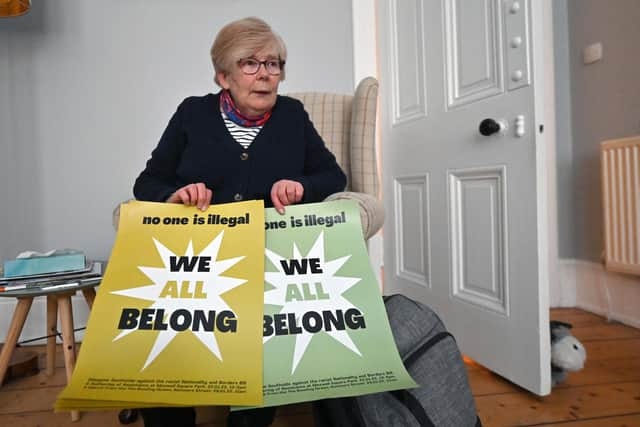

Advertisement
Hide AdAdvertisement
Hide AdThe gathering took place yesterday (Saturday) on Maxwell Square which borders Kenmure Street. There were stalls and speakers, including Pinar Aksu, from the Maryhill Integration Network, alongside Bollywood dancers, resistance badge-making and free Asian food.
“There is a great fear among many in the community,” McFarlane says. "Yesterday was about informing people. But it was also an opportunity to offer solidarity. This is not happening to the
indigenous Scottish population, but, once again, we want to say: ‘We are with you’.”
******************
Kenmure Street is book-ended by Nithsdale Road and St Andrews Road. Wandering around the small neighbourhood gives the outsider a feel for its diversity, but also its sense of community.
According to Niamat, 53 per cent of the population of East Pollokshields is of south-east Asian heritage: a lower proportion than a decade ago.
Albert Drive is a vibrant mix of shops selling Asian sweetmeats, jewellery and Shalwar Kameez in lime green, yellow, teal and peach. But the area - with its high ceiling-ed tenement flats - also attracts activists and artists of all ethnic backgrounds.
Alongside the We All Belong posters, there are many proclaiming “Black Lives Matter” and one which reads: “Thank God for Immigrants”.
Of course, Pollokshields has not been without its problems. Niamat and her peers experienced racial taunts as they grew up. There was graffiti scrawled on walls and anti-social behaviour in
the streets.
Advertisement
Hide AdAdvertisement
Hide AdWhen 15-year-old Kriss Donald was abducted from Kenmure Street and murdered by a gang of Asian men in 2004, the atmosphere grew febrile.
“There were a lot of people who were ready to latch onto it as a racist murder. They were calling for retribution,” Niamat says. “We were scared. We felt our fathers weren’t safe, our brothers weren’t safe. But bless Kriss Donald’s mother: she drove home the point that she would not allow her son’s murder to be used as a tool for hate. She said: ‘Whatever is happening
elsewhere you are not bringing that to this community’.
A few years later, the Scottish Defence League tried to exploit the anniversary of Kriss’s death.
“They got off at the train station, but they only managed to walk a few hundred yards because thousands came out and drove them away,” Niamat recalls.
For a long time, the two communities co-existed harmoniously, but without much interaction. Today, though, East Pollokshields is more integrated. Residents come together at multi-cultural events held at the Bowling Green community hub, which Niamat manages.
The Bowling Green also became a support centre, gathering clothing and other essentials, when a fatal fire at McCulloch Street left 15 families homeless in June 2021.
“There were always friendships,” Niamat says. “Neighbours would bring each other food, but in the last few years the gap between the communities has been closing.
“Having been raised in this neighbourhood, that’s what I wanted. I thought: ‘All these people I see in the street every day, let’s introduce them to my culture. Let’s do things together’. So I have organised Ramadan iftar dinners, Eid and Diwali celebrations. And we had a phenomenal COP26.”
Advertisement
Hide AdAdvertisement
Hide AdThis effort seems to be paying off. When McFarlane lived in London, her neighbourhood was a mix of indigenous British people and those of West Indian and Latino heritage. But the only non-white people she knew were an Iraqi man and his wife who ran the newspaper stall outside her flat.
In East Pollokshields, she has friends from many backgrounds. “When I was in hospital a few months ago, I was touched by how many people came to visit,” she says. “My Eritrean neighbours came. So did my Pakistani neighbours and the indigenous Scots. I really do feel part of this community.”
***********
Residents with south Asian and other ethnic minority heritages share that same sense of belonging. Those who emigrated from Pakistan and India have forged successful lives in Scotland: they have taken jobs, started business, raised families here. Their children have known no other home. But now - thanks to the Bill - they have started to worry about the future.
Niamat is the first generation of her family to be born in the UK. So she (and her parents) fall into the category of people whose citizenship could be revoked without notice.
Niamat’s parents used to tell her they needed to buy land in Pakistan because “once this country is done with us, it will throw us out”.
“I thought that was absurd,” she tells me. “I would say: ‘This is the home of democracy. There is no way that could happen’. But now it seems very real. Things are changing in front of our
eyes.”
The government claims only those guilty of serious crimes - such as terrorism - would ever be at risk. But as someone who speaks out about refugees, Niamat feels she could be targeted. In any case, the Bill creates two tiers of citizenship: one for indigenous British people and one for those from ethnic minority backgrounds.
“Priti Patel says citizenship is a privilege not a right,” says Niamat. “But I was born in Glasgow. How is citizenship a privilege for me - a person of colour - but it’s a right for someone who is white?”
Advertisement
Hide AdAdvertisement
Hide AdShe has already experienced what happens when the UK government regards you as having another country to fall back on. Just before the pandemic began, she travelled to Pakistan with her husband and young son for a funeral. The day they were supposed to return, Pakistan closed its airspace.
A two-week stay lasted two months. But what upset her was the way they were treated by the Foreign Office.
“Even though we were British, we were not a priority for the government,” she says. “They were organising repatriation for citizens stuck in lots of other countries - New Zealand, Australia. The common denominator is that they were white. It was as if they saw Pakistan as our homeland so there was no need to worry about us. But our homes, our business, our lives were all in Scotland.”
If the UK government regarded the family’s plight as Pakistan’s problem, then Pakistan regarded it as the UK’s problem. Far from belonging to two countries, it felt to Niamat as if she belonged to none.
Another Glasgow-born woman from a south Asian background, who does not want to be named, tells me she too got stuck in Pakistan for nine weeks due to Covid.
“Although my mum and dad were born there, Pakistan is not my home,” the single mother-of-two says. “I have only been there about three times in my life. I could not adjust to the lifestyle. There is no way I could cope with living there.”
When the woman, whose father owns a shop in East Pollokshields, first told her parents about the Borders Bill, they didn’t believe her. “They have British passports,” she says. “They didn’t
think it could be true."
Later, however, her dad considered selling up so he would have enough money to move back to Pakistan. “This is the scale of the fear,” she says.
***********
Advertisement
Hide AdAdvertisement
Hide AdIf passed, the Nationality and Borders Bill would also have a devastating impact on asylum seekers and refugees. As well as the push-back on Channel crossings, it would reduce the family reunion rights of refugees and introduce controversial new methods to assess the age of young people.
It would create a new law under which those who have arrived in the UK “illegally” (including all those who come across the Channel) could be arrested, prosecuted and jailed for up to four years. Yet only 1 per cent of the world’s refugees follow legal migration routes such as resettlement schemes.
Mother and daughter Hudu Alarishi and Sarra Wassu have worked with refugees on the border between Turkey and Syria and in Glasgow. Alarishi and her husband came to Scotland from Syria to study 23 years ago. They intended to return in 2011 but then the civil war began and it became impossible.
They moved to Pollokshields from Govanhill when Wassu, now 18, was six. Alarishi, who speaks Arabic, Kurmangi, some Sorani and “a wee bit of Turkish”, is chair of the Scottish Arab Women’s Association and interprets for refugees; and Wassu is in the first year of medicine at Glasgow University.
Wassu says it is difficult for asylum seekers to access information on the new Bill because of language and other cultural barriers. Many of them were already living precarious lives on the margins.
In 2020, she and Alishari were supporting a single mum with eight or nine children who arrived in Scotland just before lockdown. But one day she just disappeared. They don’t know if
she was deported or simply fled.
“The new Bill will make asylum claims more difficult and the lives of those who are being smuggled in even harder,” says Wassu. “That’s why we need to raise awareness. People’s lives are at stake; they have nowhere else to go.”
The pair agree there is a legacy to the Kenmure Street protest. “We have always had a desire to fight for each others’ rights,” Wassu says, “but it solidified that feeling.
Advertisement
Hide AdAdvertisement
Hide Ad“East Pollokshields has always been majority BAME or ethnic minority groups, but this has made us more aware of our allies from all backgrounds. It has encouraged people to make stronger friendships and helped build a better community.”
Those allies include Craig and Rachel Smillie, who live just yards from where the dawn raid was carried out last May. The couple are amateur musicians who have played in ceilidh bands. A former pupil of Shawlands Academy, Craig was taught by Morris Blythman - aka Thurso Berwick - who composed a string of anti-Polaris songs, including Ding Dong Dollar, in the early 60s.
Convinced the Kenmure Street protest ought to be memorialised, he wrote Dexy’s Under the Bus and posted it on YouTube. With rhyming couplets such as “Tell Priti Patel she can go straight to hell,” it proved an instant hit. When Craig discovered the under-the-axle hero was not in fact Dexy - a well-known local resident - but another man, who wanted to remain anonymous, this simply added to the lore.
Craig and Rachel, who founded the Glad Cafe in Shawlands, have also been involved in supporting asylum seekers and refugees.
Shortly after the body of three-year-old Alan Kurdi was washed up on the shores of southern Turkey in 2015, the couple took in a Nigerian asylum seeker and a persecuted musician from Iran.
The Borders Bill has been passed by MPs and is now with the House of Lords. On Thursday, it will reach the committee stage - the point at which it is scrutinised clause by clause and amendments are proposed and voted on.
At the second reading, it was criticised by Labour peer Lord Rosser and Conservative peer Baroness Warsi, but the Smillies remain concerned. “It seems part of the atmosphere just now that under the snowstorm of (Downing Street) parties, a lot of stuff is going through without people having much of a chance to think about it,” Craig says. “I think a lot of the people who are vulnerable to these changes must be very worried so the more support they get the better.”
********
Midday yesterday, Maxwell Square is buzzing with people of all ages and demographics.
Advertisement
Hide AdAdvertisement
Hide AdTeenagers; mothers pushing prams; couples walking dogs. There is music. Some people are dancing along.
“This gathering is not just an act of resistance, it’s an expression of solidarity, of the community we are, ” Niamat says.
The Smillies are there too, with their guitar and mandolin, playing their song. Some friends have brought an accordion and drums and the crowd joins in.
“If the Home Office try any merr of their tricks, we’ll meet them fu squerr in the pus,” they sing.
“The Kenmure Street gang will be coming alang, we’ll get Dexy back under the bus.”.
The Borders Bill is causing widespread unease, but the spirit of Kenmure Street endures.
“My fear won’t stop me from raising my voice because we cannot live in fear,” Niamat says. “When something is so wrong and goes against our human rights, you cannot be quiet. You cannot let it slide.”
Comments
Want to join the conversation? Please or to comment on this article.